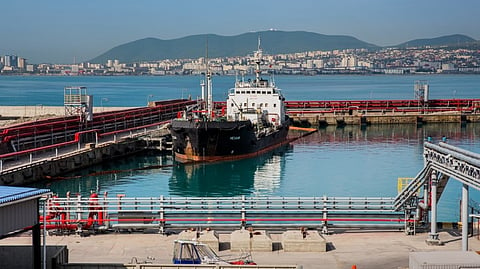

Russia has increased its planned oil loadings from the Baltic port of Ust-Luga and the Black Sea port of Novorossiisk for September, following disruptions at its main western outlet, Primorsk, two sources familiar with the schedule told Reuters.
The diversion of oil flows to less affected western ports may help Russia keep overall exports relatively stable despite infrastructure damage. Moscow is making an effort to maintain high oil sales, which remain the backbone of its budget revenue.
The increase in seaborne exports also comes amid unplanned shutdowns at several Russian refineries, which were targeted by drone attacks. Ukraine has intensified its drone attacks on Russia's oil and gas infrastructure since early August amid frustration over the direction of peace talks which the Kremlin says have now been effectively paused.
The outages have left more crude oil available for export, the sources said.
Ust-Luga is now expected to load at least 500,000 barrels per day (bpd), or two million tonnes, up from an initial plan of 1.5 million tonnes, the sources said. The port continues to operate below full capacity as repairs after the Unecha pumping station was damaged by Ukrainian drone strikes in August. Unecha is critical for flows to Ust-Luga and the Druzhba pipeline.
Novorossiisk is set to load approximately 750,000 bpd, or 3.1 million tonnes, an increase of 350,000 tonnes from the original plan. This marks the highest export level from the terminal in months, the sources added.
Meanwhile, loadings at Primorsk, which had been expected to handle 900,000 bpd in September, are facing delays and may be reduced. Crude and diesel exports from the port resumed partially on Saturday after drone attacks disrupted operations, but repairs are ongoing and the timeline for full recovery remains uncertain.
As of Thursday, two Aframax tankers — Kusto and Cai Yun — hit during the strikes remained anchored near Primorsk, according to LSEG shipping data.
One of the sources noted that diverting volumes from Primorsk to Novorossiisk is complicated due to limited tanker availability.
"It is not easy to fix a new tanker for Russian oil loadings or to change a vessel’s destination at short notice," the source said.
(Reporting by Reuters; Editing by Susan Fenton)
